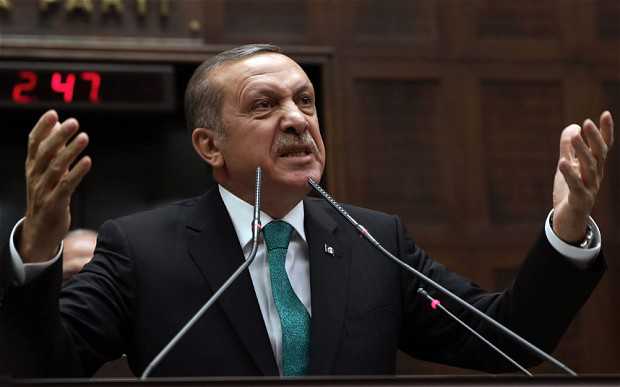stratfor
May 28, 2015 | 00:20 GMT
A story involving an imam, the pope and a Mercedes-Benz may sound like the start of a bad joke, but this is a true story that reveals a great deal about Turkey’s political path with just 10 days to go before elections.
The tale began around six months ago, when Turkish newspaper Hurriyet uncovered a budget that revealed state funds were being used to buy the head of Turkey’s Presidency of Religious Affairs an S500 Mercedes-Benz worth $385,000. The story didn’t gather steam until early May, in the thick of Turkey’s election season, when Turkey’s opposition parties took turns pouncing on President Recep Tayyip Erdogan’s government for its exorbitant spending habits. The would-be owner of the flashy car, Mehmet Gormez, opted to escape the controversy by sheepishly declaring that he would return the car and “set an example.”
But Erdogan saw an opportunity of his own in making Gormez an example. Last Thursday, Erdogan swept away the criticism and declared that his office will provide the cleric with an armored Mercedes. And if that was not enough fuel to add to the fire, Erdogan said in a television interview on May 26 that he would give Gormez a private jet. After all, the president coyly explained, the pope “has a private jet, private cars and armored vehicles. That’s the situation at the Vatican, and our religious leader will take scheduled flights?”
What is a Geopolitical Diary? George Friedman Explains.
Never mind that the Vatican spent most of Wednesday painstakingly calling up news agencies to clarify the populist credentials of Pope Francis, who apparently has no problem flying commercial and putters around Vatican City in a Ford Focus. What matters here is the message that Erdogan is broadcasting — not to bewilder foreign media and not to rile up his opposition, but to solidify support within his core constituency.
Remember what Erdogan represents: He is the leader of a more pious class whose roots are mostly in Anatolia. It is a class that has spent most of Turkey’s history sidelined from power while a secular, military-backed elite dominated the country’s institutions and political economy from their stronghold around the Sea of Marmara. Erdogan’s Justice and Development Party and its predecessors neutralized the political clout of the military, raising a new business class and stacking institutions — including ministries, courts, newspaper agencies and schools — with allies that looked first and foremost to Erdogan as their patron. Without Erdogan in power, the perks of being a member of Erdogan’s patronage network would be lost. To these constituents, Erdogan’s message is quite clear: If you are my ally, you will be taken care of.
The message also goes beyond Erdogan’s flamboyant tactics in trying to preserve a cult of personality around his presidency. The victim of this controversy, the Presidency of Religious Affairs, has an important history. The Presidency, or “Diyanet,” was established in the early years of the republic in 1928. At the time, Turkey’s founder, Mustafa Kemal Ataturk, was crafting a strategy to manage religion in the new state. In carving a state out of a multi-ethnic and multi-religious empire, Ataturk understood that religion had to play some role in distinguishing Turkish citizens from non-Muslims. But Ataturk also saw the dangers of religion drawing the state back toward pan-Islamic ambitions, risking another collapse of the state should those far-flung ambitions once again overwhelm the center.
Ataturk thus tried to strike a balance. He took the radical steps of banning the caliphate, closing down religious schools and removing a clause from the constitution saying that “Islam is the religion of the republic.” At the same time, he created the Presidency of Religious Affairs to manage religion on the state’s terms. Rather than separate mosque and state, Ataturk sought to institutionalize a state-run version of Islam.
For the last dozen years, Erdogan has been trying to rewrite Ataturk’s script for the republic. Religion would no longer be tamed by the state; it would define the state once again. This position has alienated half of the country, but has at the same time given hope to another half who deeply identify with their religion and see Turkey as the deserved leader and model of the Islamic world.
The June 7 election will tell us just how wide this fissure in Turkey’s identity politics is. What may seem like foolish political tactics to many could well translate into an astute political strategy by a man who has managed to win the hearts and minds of millions of Turks.
At the same time, Erdogan is undoubtedly taking a risk. He came into power as the savior for the Anatolian masses, liberating the country from what he characterized as an obsolete and corrupted elite. Turkey’s pugnacious president wants his followers to know that any ally of Erdogan will be protected and live the good life. But the economy is on shaky ground, the party’s pan-Islamic foreign policy is exposing the country’s vulnerabilities, and Erdogan’s populist credentials are being questioned in light of his unapologetically lavish spending. We see the logic. We also see the risk. At least for Erdogan, this is a gamble worth taking.
